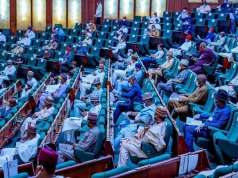The Federal Government has increased the 2024 budget proposal from the initial N26 trillion to N27.500 trillion to meet present economic realities.
It also revised the Medium Term Expenditure Framework, MTEF and Fiscal Strategy Papers, FSP, which initially had N700 per dollar as exchange rate to N750 per dollar, while oil benchmark was reviewed from the initial $73 per barrel approved by the National Assembly to $77 per barrel.
The Minister of Budget and Economic Planning, Atiku Bagudu, who disclosed these while briefing State House correspondents at the end of the Federal Executive Council, FEC, meeting, presided over by President Bola Tinubu at the Council Chamber, Presidential Villa, Abuja yesterday, said further details of the budget would be released when the president presents the budget to the National Assembly tomorrow.
Bagudu said the MTEF and fiscal policy frameworks which had been passed by the National Assembly, were further reviewed.
According to him, “this has the aggregate of N27.5 trillion which is an increase of over 1.5 trillion from the previously estimated sum, using the old reference prices.”
The minister disclosed the forecast revenue for 2024 to be N18.2 trillion, explaining that it was higher than the 2023 revenue, including that provided in the two supplementary budgets, which the deficit was lower than that of 2023.
He said: “The Federal Executive Council considered the 2024 Appropriation Bill. The MTEF was earlier approved by the National Assembly. It has an exchange rate of N700 to a dollar and a crude oil benchmark of $73.
“To improve revenue, the council further reviewed the MTEF, with an exchange rate of N750 to a dollar, and a crude oil benchmark of $77. This will significantly improve revenue.”
Similarly, FEC approved the 2024 Appropriation Act and presentation of such to the National Assembly by the President.
Also briefing, the Minister of Finance and Coordinating Minister of the Economy, Mr. Wale Edun, said that the council approved $1 billion budget support loan from African Development Bank, AfDB.
He said: “There was a briefing by the Fiscal Policy and Tax Reform Committee. Essentially, they’ve been working for roughly 90 days, they’ve been working very well and very effectively, such that they are in a position to have even impacted the economy by coming up with initial reforms, as well as signposting the way forward in terms of very important targets.
“So in a nutshell, the policy on VAT removal on diesel is from them, they are looking to help boost fiscal situation of the government by increasing revenue, particularly tax revenue, through digitalization, additional efficiency and rationalization of the range of taxes we have at the moment.
“They are looking to increase the ratio of tax-revenue-to-GDP to 18 per cent, which is the average for Africa; so many countries are above that level. It is actually about double where we are now and within a matter of a few years, their target is to reach 18 per cent.
“Other economic measures, in the short term, are being contemplated and their report was well received by Mr. President and, indeed, the whole Federal Executive Council.
“At the same time, I would like to give a summary of the memos that I had approved at Council today and, of course, they were all to do with financing. First of all, there was an inherited financing, an inherited loan processing, which was to do with the $100 million financing from African Development Bank and $15 million from the Canada-African Development Bank Climate Fund.





![How To Secure Nigerian Visas For Tourists, Investors, Others [SEE FULL STEPS] How To Secure Nigerian Visas For Tourists, Investors, Others [SEE FULL STEPS]](https://abntv.com.ng/wp-content/uploads/2024/05/Nigerian-Visas-For-Tourists-300x194.jpg)




![How To Secure Nigerian Visas For Tourists, Investors, Others [SEE FULL STEPS] How To Secure Nigerian Visas For Tourists, Investors, Others [SEE FULL STEPS]](https://abntv.com.ng/wp-content/uploads/2024/05/Nigerian-Visas-For-Tourists-100x75.jpg)